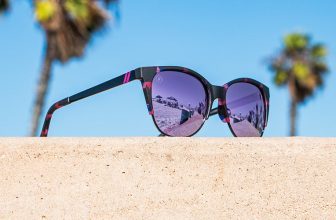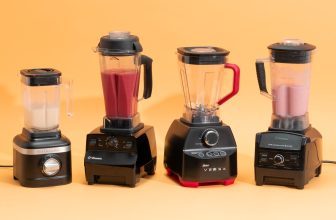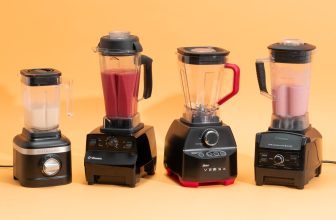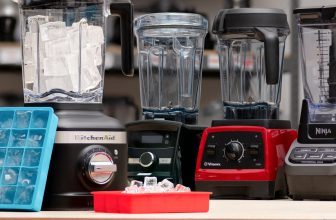As an Amazon Associate I earn from qualifying purchases.
Does Best Buy Recycle Blenders?
Does Best Buy Recycle Blenders? Have you ever thought about the fate of your old blender once it stops working? It’s a common household item, yet many of us don’t consider the environmental impact of simply tossing it in the trash. Surprisingly, Best Buy provides a solution that not many retailers offer—recycling services for blenders and other small appliances.
No products found.
Best Buy has taken significant steps to facilitate the recycling of electronic waste, a program they began many years ago. Notably, they have recycled over two billion pounds of electronics and appliances as part of their sustainability efforts. This includes accepting an array of small kitchen gadgets, offering a convenient and responsible option for consumers to dispose of their blenders without contributing to landfill waste.
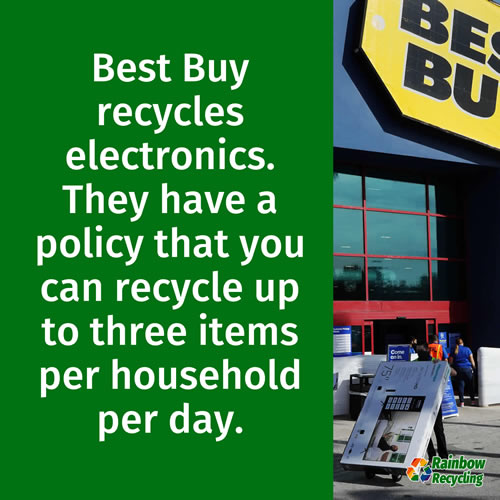
Does Best Buy recycle blenders?
Yes, Best Buy does recycle blenders. They have a comprehensive recycling program that accepts a variety of household electronics and appliances, including small kitchen items. This service is part of their commitment to reducing electronic waste and promoting a more sustainable future. You can bring your old blender to any Best Buy store for recycling. This program is available to anyone, whether you purchased the blender from Best Buy or not.
Best Buy’s recycling program started over a decade ago and has grown significantly since then. They have recycled millions of pounds of electronics, making it easier for people to dispose of their gadgets responsibly. Blenders, like many small appliances, contain materials that can be harmful to the environment if not disposed of properly. By recycling your blender at Best Buy, you help prevent these materials from ending up in landfills. It’s a simple yet impactful way to contribute to environmental conservation.
The process of recycling at Best Buy is straightforward. You simply take your old blender to the customer service counter at any store. There, a staff member will guide you through the recycling process. There is no need for complicated preparations or additional fees for most items. Best Buy makes it convenient, ensuring you can easily participate in their recycling efforts.
Recycling your blender at Best Buy not only helps the environment but also supports the company’s broader sustainability goals. They aim to recycle more and more electronic waste each year. This initiative has garnered positive feedback from customers and environmental groups alike. To learn more about which items you can recycle, you can visit Best Buy’s website or contact a local store. They provide detailed information to help you recycle various household items beyond just blenders.
Best Buy’s recycling program
Best Buy’s recycling program offers a comprehensive solution for disposing of unwanted electronics and appliances. The program has been in place for over a decade, aiming to reduce electronic waste and promote sustainability. Customers can recycle many items regardless of where they were purchased. By participating, you help to keep harmful materials out of landfills. Best Buy makes it easy and convenient to recycle, benefiting both consumers and the environment.
The types of items accepted for recycling span a wide range. This includes everything from small kitchen gadgets to larger household appliances. Some common items you can recycle at Best Buy are blenders, toaster ovens, and microwaves. The company also accepts various electronic devices like computers, phones, and batteries. By offering such a diverse list, they address many of the common electronic items found in households.
Best Buy’s recycling services are available at all their retail locations. You simply need to bring your recyclable items to the customer service desk. Depending on the item, there might be a small fee, especially for larger appliances. However, many items can be recycled for free. This makes it an accessible option for most people looking to dispose of electronics responsibly.
Besides in-store recycling, Best Buy also offers haul-away services for larger items when you purchase a replacement. This service is particularly useful for bulky appliances like refrigerators and washing machines. For a fee, they will remove the old item and ensure it is recycled properly. By offering these additional services, Best Buy helps customers make environmentally friendly choices effortlessly. For more information on what you can recycle, you can visit their [recycling service page](https://www.bestbuy.com/site/services/recycling/pcmcat149900050025.c?id=pcmcat149900050025).
Types of appliances Best Buy recycles
Best Buy recycles a wide variety of household appliances to help reduce electronic waste. These include common kitchen gadgets like blenders, coffee makers, and microwaves. They also accept larger items such as refrigerators, washing machines, and air conditioners. By offering to recycle both small and large appliances, Best Buy provides a convenient way for consumers to dispose of their old items responsibly. It’s a comprehensive program designed to make recycling accessible for everyone.
Besides kitchen and large appliances, Best Buy also recycles various electronic devices. This includes computers, laptops, and tablets, as well as smaller gadgets like smartphones and MP3 players. They even accept accessories such as cables, chargers, and batteries. These items often contain harmful chemicals that should not end up in landfills. Best Buy’s recycling program helps ensure that these components are disposed of properly and safely.
Interestingly, Best Buy also accepts items that many people might not think to recycle. These are items like old TVs, DVD players, and game consoles. Even home office equipment such as printers, fax machines, and shredders can be recycled. By offering such a wide array of recycling options, Best Buy covers most of the electronic and appliance categories found in homes today. This thorough approach encourages more people to participate in recycling efforts.
Some items are accepted for free, while others may incur a small fee, especially larger appliances. For a detailed list of what you can recycle at Best Buy, you can visit their [recycling service page](https://www.bestbuy.com/site/services/recycling/pcmcat149900050025.c?id=pcmcat149900050025). Here’s a quick reference of items they typically accept:
- Small kitchen appliances (blenders, coffee makers)
- Large appliances (refrigerators, washing machines)
- Electronic devices (computers, tablets, smartphones)
- Home office equipment (printers, fax machines)
The environmental impact of recycling blenders
Recycling blenders has a significant positive impact on the environment. When blenders are recycled, valuable materials like metal, glass, and plastic can be reused. This reduces the need for mining and manufacturing new resources, which is energy-intensive and pollutes the environment. Recycling also prevents these materials from ending up in landfills, where they would take years to break down. By recycling your blender, you’re helping to conserve natural resources and reduce pollution.
Electronic waste, or e-waste, is a growing concern globally. Blenders, being small kitchen appliances, contribute to this problem if disposed of improperly. E-waste often contains hazardous substances like lead, mercury, and cadmium, which can leach into soil and groundwater. Recycling helps mitigate these risks by ensuring these harmful materials are handled safely. This way, the hazardous components are either contained or repurposed, protecting the environment and human health.
Recycling blenders also helps reduce carbon emissions. Manufacturing new appliances from raw materials requires much more energy compared to using recycled materials. By recycling, we cut down on the energy consumption associated with production. This leads to lower greenhouse gas emissions, which is crucial in fighting climate change. Every recycled blender contributes to making our planet a bit greener.
The process of recycling blenders involves separating different materials for proper disposal and reuse. Metals are extracted and melted down for new products, while plastics are processed and reused in various applications. This process creates a circular economy, where products are continually repurposed instead of becoming waste. It’s a sustainable approach that minimizes environmental impact and promotes resource efficiency.
Best Buy’s recycling program plays a vital role in making these environmental benefits accessible to everyone. By providing a convenient drop-off service, they encourage more people to recycle their old blenders and other small appliances. This collective effort can lead to substantial environmental improvements. The more people who participate, the greater the positive impact on our planet.
Other alternatives for recycling your blender
Besides taking your blender to Best Buy, you can explore other recycling options to ensure it’s disposed of responsibly. One option is to check with your local waste management facility. Many communities have designated e-waste drop-off points where you can recycle small appliances. These facilities often have specific days or events for collecting electronic waste. It’s an excellent way to support local recycling initiatives.
Another alternative is to use manufacturer take-back programs. Some blender manufacturers offer their own recycling programs as part of their sustainability efforts. You can visit their websites to see if they provide options to mail in your old blender for recycling. This ensures that the appliance is handled according to the manufacturer’s recycling standards. It’s a convenient option if you prefer dealing directly with the brand.
Donating your old blender, if still in working condition, is also a great choice. Many non-profits and charity organizations accept small kitchen appliances to help those in need. Thrift stores and community centers are other places that might benefit from your donation. By giving your blender a second life, you help reduce waste while supporting a good cause. It’s a win-win solution for everyone involved.
If you’re feeling creative, consider repurposing parts of your blender for DIY projects. The motor or blades might be usable in other small machinery or art projects. Websites and forums dedicated to DIY crafts can provide inspiration and instructions. Repurposing not only keeps materials out of landfills but also sparks creativity. It’s an inventive way to make the most out of your old blender.
Finally, you can look into specialized e-waste recycling services. Companies dedicated to electronic waste often accept a wider range of items than general recycling programs. They have the expertise to dismantle and recycle electronics efficiently. Some even offer pick-up services for your convenience. To find these services, a quick online search will yield several local and national options.
Frequently Asked Questions
Many people are curious about how Best Buy’s recycling program works and what items can be recycled. Here are some of the most commonly asked questions regarding Best Buy’s recycling efforts.
1. What other small appliances does Best Buy recycle?
Best Buy recycles a variety of small kitchen appliances in addition to blenders. These include coffee makers, toasters, microwaves, and mixers. You can bring these items to any Best Buy store for responsible disposal. This helps reduce the amount of electronic waste that ends up in landfills.
The recycling process ensures that useful materials like metal and plastic are recovered and reused. This benefits the environment by conserving resources and reducing pollution associated with manufacturing new products from raw materials.
2. Is there a fee to recycle my blender at Best Buy?
No, you can typically recycle your blender at Best Buy for free as part of their commitment to sustainability. While many small appliances are accepted without charge, it’s always best to check their website or call a store for specific details. Larger appliances might have a small fee attached for recycling services.
This no-cost option makes it convenient for consumers to participate in responsible disposal practices. It encourages more people to take advantage of this service, contributing positively to environmental conservation efforts worldwide.
3. Can I recycle non-working blenders at Best Buy?
Yes, you can recycle non-working blenders at Best Buy as part of their comprehensive recycling program. It doesn’t matter if the appliance is broken or non-functional; they will still accept it for recycling. The goal is to prevent electronic waste from ending up in landfills by providing easier ways for consumers to dispose of unwanted items responsibly.
This approach ensures that even damaged electronics are properly processed. Materials such as metals and plastics can be extracted and repurposed, which helps reduce overall environmental impact.
4. How do I prepare my blender for recycling at Best Buy?
No special preparation is required when bringing your blender for recycling at Best Buy. However, it’s a good idea to clean out any food residues before dropping it off at the store’s customer service desk where they’ll handle the rest.
If you have accessories like jars or lids that came with the blender, you may also bring those along if they need recycling too. This ensures that all parts receive proper handling according to e-waste regulations.
5. Does Best Buy offer haul-away services for large appliances?
Yes, Best Buy offers haul-away services for large appliances like refrigerators and washing machines when you purchase replacements from them. For an additional fee, they will remove your old appliance during delivery of your new one and ensure it’s recycled properly through their program.
This service simplifies the process of disposing bulky items while ensuring they’re handled responsibly rather than ending up in landfills prematurely. Contacting local stores or visiting their website provides more information on scheduling pickups relative fees involved depending on appliance types being replaced/recycled together efficiently overall!
Conclusion
Best Buy’s recycling program for blenders and other appliances offers a simple and impactful way to reduce electronic waste. By participating, consumers help conserve valuable resources and protect the environment. This initiative makes it easy for everyone to contribute to sustainability efforts.
Recycling at Best Buy is not just about convenience; it’s a step towards a greener future. The variety of accepted items ensures broad participation, promoting responsible disposal of electronics. Together, these efforts create a significant positive impact on the environment.



